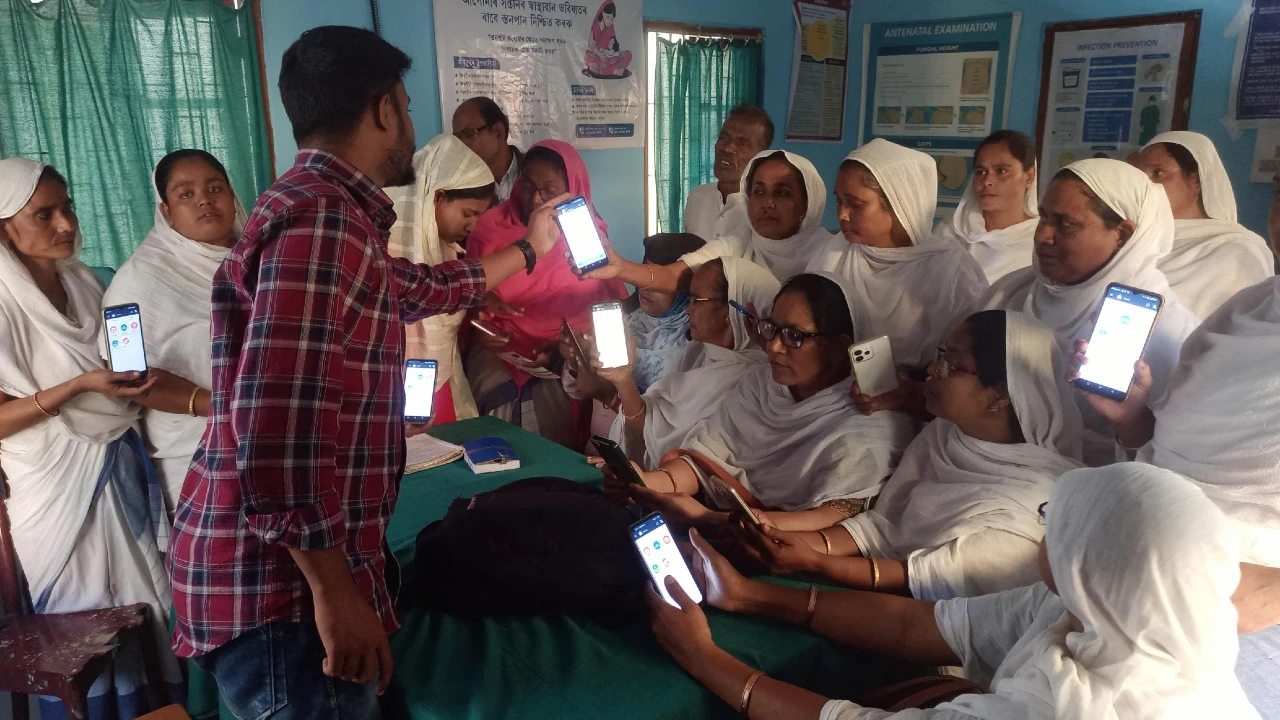
Empowering ASHAs with Sakhi: A Success Story of AMRIT’s Digital Transformation
In the rural and underserved areas of India, Accredited Social Health Activists (ASHAs) have long been the backbone of healthcare delivery. However, the challenges they face in managing data for beneficiary registration, health tracking, and service delivery are immense. Traditionally, ASHAs have used multiple registers, leading to issues of manual errors, data loss, and lack of real-time accessibility. The solution? Sakhi, an innovative mobile application developed as part of the AMRIT initiative, is transforming the way ASHAs operate in the field.
The Problem: Data Overload and Inaccuracies
ASHAs, who serve as the first point of contact for community health services, are responsible for a wide range of tasks, including maternal and child health monitoring, immunizations, noncommunicable disease (NCD) tracking, and family planning. In the absence of an integrated system, these workers often rely on paper-based registers, leading to data duplication, loss, and inaccurate health information. This, in turn, can hamper the timely and effective delivery of healthcare services.
Enter Sakhi: The Digital Solution for ASHAs
The Sakhi application, developed under the AMRIT initiative, is designed to address these challenges. This mobile application enables ASHAs to digitally record beneficiary-level data, track noncommunicable diseases, monitor maternal and child health, manage immunization schedules, and much more. The app streamlines data collection, reduces errors, and enhances the efficiency of ASHAs, allowing them to focus on delivering care rather than managing paperwork.
By creating an electronic health record (EHR) for each beneficiary, Sakhi ensures that critical health data is stored securely and can be accessed by health officials at the block, district, and state levels. This digital continuity of care helps inform decision-making processes, improving both service delivery and health outcomes at the community level.
Pilot Phase: A Transformative Shift in Healthcare Delivery
In the pilot phase, Sakhi was deployed in Muzaffarpur (Bihar) and three districts of Assam (Barpeta, Baksa, and Darrang). The application was introduced to 344 ASHAs in Bihar and 116 ASHAs in Assam, who began using the app to record data from over 34,000 beneficiaries across both states.
Here are some key outcomes from the pilot phase:
1. Transformation of the Community Image of ASHAs
The implementation of Sakhi has significantly enhanced the image of ASHAs within their communities. ASHAs have become more knowledgeable and confident in their work, thanks to the training and resources provided by the application. The app has not only empowered ASHAs but also strengthened their relationships with beneficiaries, as the community now views ASHAs as trusted health advisors.
2. Improved Service Delivery
One of the key benefits of Sakhi is the ability for ASHAs to easily identify high-risk beneficiaries. This has improved their ability to provide personalized care based on the unique health needs of each individual. In Bihar, 65% of ASHAs found the app useful for segregating high-risk beneficiaries, compared to 45% in Assam. This capability has increased the ASHAs’ coverage, enabling them to serve more people and ensure that care is provided promptly and effectively.
3. Coordinated Care at the Ground Level
The integration of the Sakhi app with AMRIT has facilitated better coordination between ASHAs and other frontline health workers (FLWs) such as Auxiliary Nurse Midwives (ANMs). By digitalizing the data collection process, ASHAs can more effectively share information with ANMs and supervisors, ensuring that health interventions are aligned and timely. This collaborative approach has improved health outcomes and fostered a sense of community between ASHAs and ANMs.
4. Strengthened Support Systems
ASHAs in Bihar have benefited from continuous support from Gandhi Fellows, who have provided on-ground assistance in using the application. This mentorship has played a critical role in ensuring that ASHAs are able to use the app optimally, leading to better adoption and usage rates during the pilot phase. The success of this early-stage support is something AMRIT plans to continue and scale across other regions.
People now call us ‘guardians.’ They trust us more because we bring valuable health knowledge and offer suggestions for better care. The app has made our work easier and more impactful.
ASHA from Muzaffarpur, Bihar
Best Practices: Paving the Way for Future Success
The success of Sakhi in the pilot phase can be attributed to several best practices:
- Early Identification of Health Issues: The app enables ASHAs to identify health problems at an early stage, helping them refer beneficiaries for appropriate care and providing a continuum of care.
- Regular Follow-ups: Regular check-ins with ASHAs ensure they feel supported and confident in using the application, enhancing overall usability and efficiency.
- Integration with AMRIT: By working in tandem with AMRIT’s other health initiatives, Sakhi helps in localizing health surveillance and tracking endemic diseases, creating a real-time alert system for health authorities.
Before, we only knew about pregnant women and their health needs. We didn’t have information on diseases like hypertension. But after the training, we learned about various diseases and are able to inform women and help them stay healthy.
ASHA from Baksa, Assam
The Road Ahead
The success of Sakhi in its pilot phase is just the beginning. As the application continues to scale across more districts, it will contribute to better healthcare outcomes for millions of beneficiaries. By empowering ASHAs with the tools they need, AMRIT is helping create a more sustainable and efficient healthcare system in rural India—one that can respond to the diverse and evolving health needs of its communities.
Through digital empowerment, the Sakhi app is not just transforming how ASHAs work—it is reshaping the very fabric of community healthcare in India, ensuring better health, improved outcomes, and a brighter future for all.